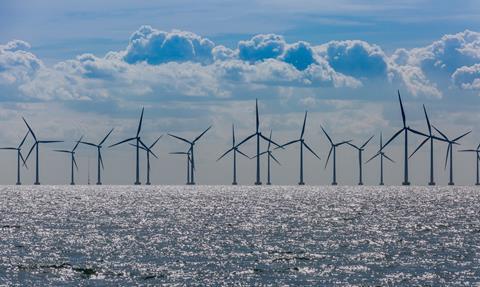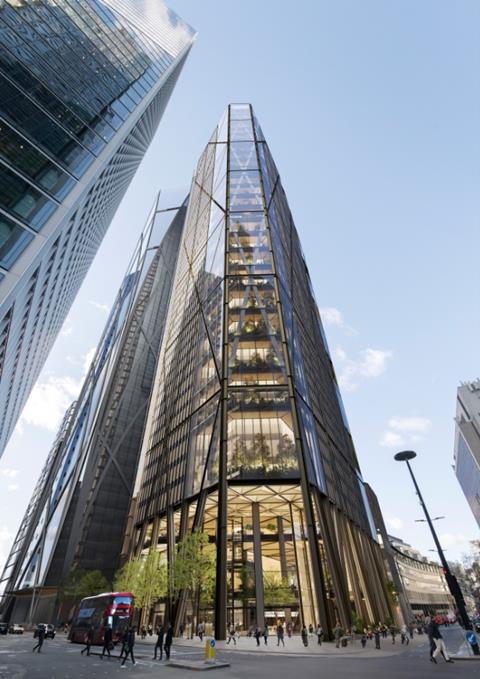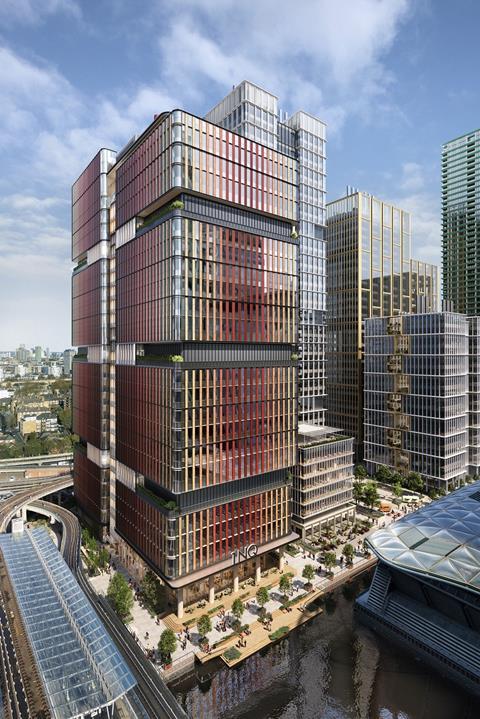The UK managing director talks to Tom Lowe about the impact that government dithering over net zero policy has had on her firm and the industry as a whole over the past five years

“It hasn’t been easy for the past three years. It hasn’t been easy for the past five years…”

Philippa Spence is reflecting on her experience at the top of the UK construction sector since joining Ramboll in 2019. Working through this period of turbulence – from the pandemic to economic stagnation and high inflation – has been “exhausting”, the firm’s UK managing director admits. But the hardest part? Dealing with politicians.
Spence speaks to both Conservative and Labour front-benchers in her role as chair of the Environmental Industries Commission, an industry group which lobbies the government on climate policies. While both political parties appear committed to net zero targets, they are “hard to read” on the direction and speed of travel for specific policies. “It has been a very confusing time from a policy point of view,” she says.
Spence studied anthropology and then a management postgraduate degree at the University of the Witwatersrand in her native Johannesburg during the last days of apartheid. “I lived through an extraordinary time,” she says. “I was very passionate about apartheid coming to an end and very active about that.”
One of her first jobs was working with South Africa’s independent electoral commission on the country’s second democratic elections. “What a privelege [that was]. That experience has been pretty formative in terms of my values.”
She moved from her native Johannesburg to London in 2002 out of “curiosity” and a sense of wanting to work internationally. The economy was growing steadily at about 3% a year. Tony Blair had just won his second landslide election and was at his pre-Iraq war peak.
It was an unusually tranquil time for the UK, compared with the past decade and a half. But it is the lack of consistency on policy over the past five years which has been most damaging, Spence suggests.
Ramboll is a Copenhagen-based engineering consultant with a turnover of £1.84bn in 2022. Scandinavia accounted for just over half of its income last year, with 23% coming from the Americas, 9% from the UK, 5% from Germany and 9% from the rest of the world.
The speed, the ability to fund it, the ability to invest in new technology – that has slowed up. That’s the big problem
The firm has gone all in on sustainability and the net zero market. This depends on clients choosing to develop low-carbon schemes – and that depends on finance from private equity investment.
“There’s a sort of chain and, at some point in that chain, it becomes weaker when there isn’t belief that the government is going to stay consistent and true to its commitments towards sustainability.
“So, at some point, almost every business we work with, although generally… the commitment to sustainability remains clear, the speed, the ability to fund it, the ability to invest in new technology – that has slowed up. That’s the big problem.”
Theresa May’s pledge in 2019 to make the UK net zero by 2050 had a profound impact on Ramboll. “It was a clarion call. Fantastic, let’s go. We have globally shifted our entire strategy in that direction,” says Spence.
But that generational gear shift has been steadily eroded in the years since, most notably by Rishi Sunak last September when he watered down many of the targets for carbon emissions reduction, including the replacement of gas boilers.
That same week, a government auction for new offshore wind contracts failed spectacularly when no developers made bids because they believed the prices had been set too low. It was “an abject disaster,” according to Spence.
“It has affected us,” she admits. “We would have seen more work of a certain kind – which is really trying to push the green boundaries, be innovative, if we had not had as much flip-flopping from government as we have seen.”
The alternative in this year’s upcoming election has hardly been reassuring. Labour leader Keir Starmer sensationally U-turned on his party’s flagship economic policy in February when he cut a pledge to invest £28bn a year in green initiatives to just £4.7bn. The news came days after he told an interviewer that the original sum was “desperately needed”.
We’re dealing with higher degrees of geopolitical instability than we have for decades
“It sends a bad signal to industry about how real our commitment to climate action actually is. So I’m disappointed,” Spence says.
It also came in the wake of the Uxbridge and South Ruislip by-election, which the Conservatives held despite a significant campaign from Labour. The result was attributed to a backlash against London mayor Sadiq Khan’s proposed extension of the Ultra Low Emission Zone (ULEZ) to outer London.
Clearly, some of Westminster’s reluctance to press on with climate targets over the past few years is a result of spiking energy prices following Russia’s invasion of Ukraine, and the resulting impact on economic growth and cost of living. But the backdrop to this is that 2023 was the hottest year on record, with global average temperatures topping 1.5C above pre-industrial levels for the first time.
“We’re dealing with higher degrees of geopolitical instability than we have for decades,” Spence adds. “So I’m not surprised at the degree of flip-flopping. However, what sits behind that is a genuinely existential threat.”

So, why are the two main parties still dithering? The pursuit of net zero has “clearly become a political football”, Spence laments. “I suspect it’s political. It’s about positioning in a way that each party feels they will get the best outcome. And, however you look at the green transition, it is a highly controversial area.”
What poses a threat to Ramboll and the UK construction industry, much of which has made similar strategic moves towards the green market since 2019, is a loss of confidence from international investors. “What’s worrying is the signals it puts out to potential investors who can choose anywhere in the world to invest,” Spence says.
“It’s about how serious and how attractive a market we are here in the UK. How much subsidisation and support and enablement will [investors] get in the UK compared to somewhere else?”
It is not a surprise that Spence talks so much about the difficulty she has faced in navigating Ramboll UK through this policy context in recent years. She speaks to ∫⁄∂¥…Á«¯ from the firm‚Äôs London headquarters just south of Blackfriars bridge.

Through the window behind her can be seen the vacant site of Foster + Partners’ £1bn 18 Blackfriars scheme, which has itself been delayed for years by talks with local councillors.
What might be a surprise is Ramboll UK’s actual performance over this period. The firm says it had its best year ever in 2023. The previous year it raked in revenue of £160m, an increase of 21% compared with 2021, according to the firm’s latest published accounts.
It has achieved this by focusing on three key growth sectors: life sciences, healthcare and high-tech, which includes data centres. Major recent projects include One North Quay, a 23-storey life sciences tower in Canary Wharf being developed by Kadans, and 99 Bishopsgate, Brookfield’s 54-storey City office tower which was submitted for planning last month.
Spence attributes Ramboll’s success in the UK market, which saw its contribution to the group’s turnover increase by 1% last year from 8% in 2022, to two main reasons. One is a focus on “very specific sectors that we can actually grow in”, and the other is its low staff turnover.
“People stay. They like working for Ramboll. We put a huge amount of effort into that, to make sure that we earn the right to every person’s day…with professional development, with a really inclusive culture. Those are the kind of things that for me personally, genuinely, are critical to a high performing culture.”
The UK office was rewarded with pre-tax profit of just over £10m in 2022. After tax, this works out as a net profit margin of around 5.5%, a figure not unusual for an engineering firm but beyond the wildest dreams of many of the main contractors with which Ramboll works.
Construction insolvencies made up the largest number of business failures out of any sector last year. “I think it’s a tragedy,” Spence says.
She also thinks such failures are avoidable through better procurement, led by the public sector, although she falls short of backing a mandatory 5% margin for contractors. “It’s a tough sell,” she admits.
“I mean, of course, how wonderful would that be? But I think we would have to really flesh out the unintended consequences elsewhere if we had a rule like that. It might just completely stifle development overall, because it would become unaffordable.”

But circumstances have changed so much over the past few years that Spence believes a refresh is needed, and it comes back to the green agenda. “This is a sector that generates so much work, and it’s also one of the routes that will allow us to become a green transition superstar. But, if we can’t fix that issue of low profit and low margins, that ambition is potentially at risk.”
Another solution could be looking at ways to increase productivity through new approaches such as AI, she says. The problem with this is that you need companies that are doing well enough to have the resources to invest in innovation.
It is different from the early 2000s, but the UK is still an attractive place, for sure
This is a structural shortcoming of the UK economy that goes beyond construction and has its origins in the financial crisis. Productivity in the UK is almost 40% below that in the US and 20% lower than in Germany and France. Reversing this trend will be key to turning around this country’s economy and enabling more consistent progress towards net zero.
Spence is nevertheless still optimistic about the prospects of the UK industry. She moved to London at the age of 28. Were she that age now, would she still move here? “Yes,” she says. “It is different from the early 2000s, but the UK is still an attractive place, for sure.
“We are amazing, as a country, in terms of our grit, and hanging on and keeping going. And flourishing when we get even a chunk of an opportunity to do that.
“So, if we do have a government – whichever one it is – that really focuses down on the opportunities of the green transition that are right in front of us, we will be just in time to really take advantage of that. But we have to move fast.”
Election focus

As thoughts turn towards the next general election, the UK is facing some serious problems.
Low growth, flatlining productivity, question marks over net zero funding and capability, skills shortages and a worsening housing crisis all amount to a daunting in-tray for the next government.
This year’s general election therefore has very high stakes for the built environment and the economy as a whole. For this reason,
∫⁄∂¥…Á«¯ is launching its most in-depth election coverage yet, helping the industry to understand the issues in play and helping to amplify construction‚Äôs voice so that the government hears it loud and clear.
We kick off by looking at the state of play across the key topic areas. ∫⁄∂¥…Á«¯ is also investigating the funding gaps facing the next government‚Äôs public sector building programmes, looking at the policy options available to the political parties.
In the coming months our ∫⁄∂¥…Á«¯ Talks podcast will focus on perhaps the hottest political topic: the housing crisis. The podcast will feature interviews with top industry names who side-step soundbites in favour of in-depth discussions.
As the main parties ramp up their policy announcements, we will keep you up to date with their latest pledges on our website through our “policy tracker”.



























No comments yet